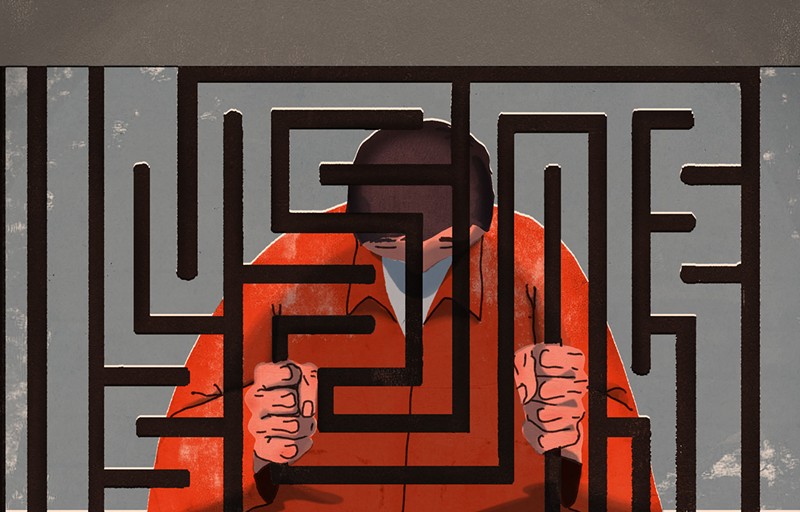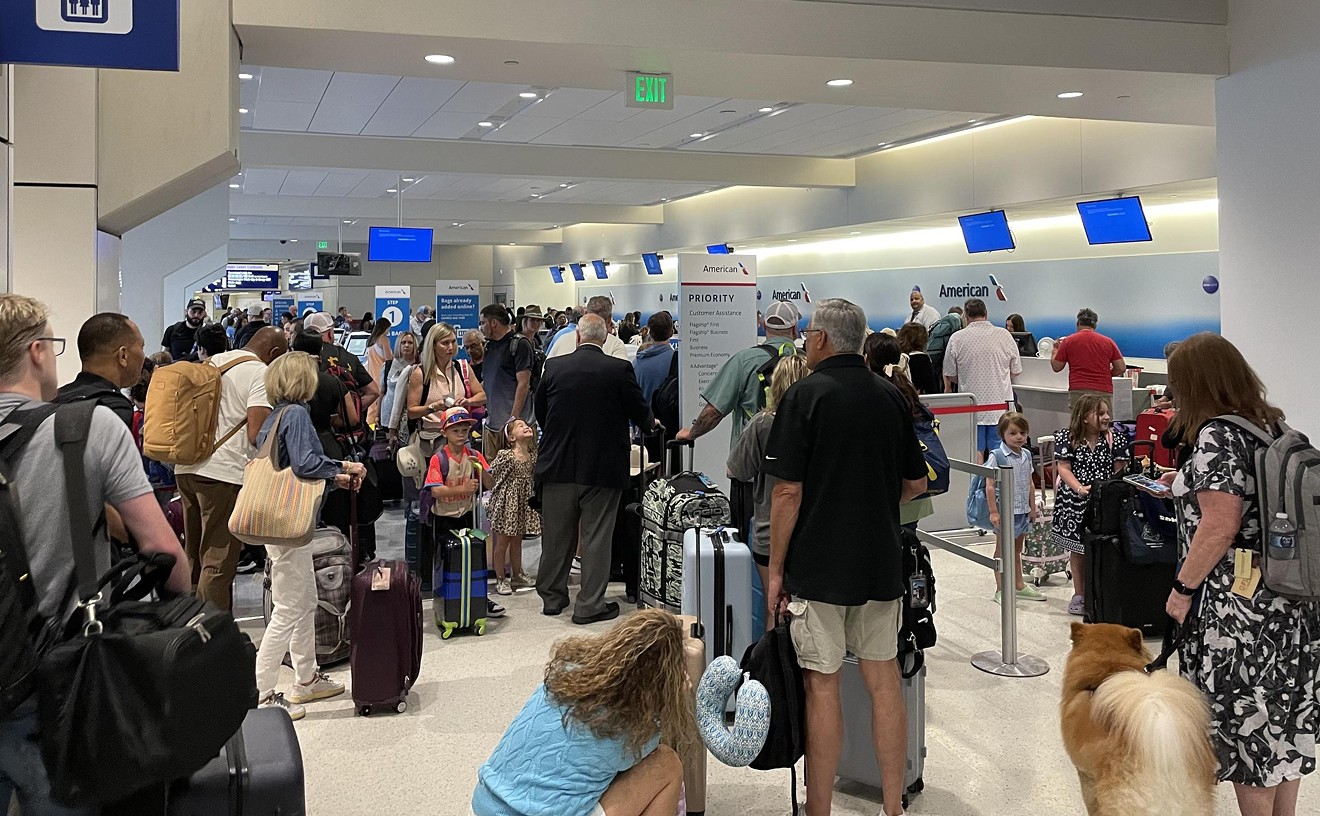Hernandez, now free and attending graduate school, was incarcerated on robbery and domestic violence charges in the Price Daniel Unit in Snyder, a prison about four hours west of Dallas. During the summer months of each of his 10 years in incarceration, he and his fellow prisoners were forced to share a low supply of water and a few extra fans.
“One 10-gallon water cooler is placed in our living area under lock and key,” he wrote in Prison Writers, a publication by incarcerated people. “This 10-gallon cooler must provide cold water for 84 inmates, which it never does. An inmate can expect to get one 8 oz. cup of water every four hours. Moreover, ice for the cooler is only provided twice a day and the ice frequently melts before the hottest part of the day.”
His brief yet searing story also notes that the extra fans “simply circulate hot air” when the temperature exceeds 95 degrees, which it often does in West Texas. “It routinely feels,” he wrote, “as if one’s sitting in a convection oven being slowly cooked alive.”
According to a scathing new report, Hernandez’s plight is nothing new for incarcerated Texans. With the sixth-highest state imprisonment rate, Texas is one of at least 13 states in the U.S. that does not have universal air conditioning in state prisons. Since 70% of Texas prisons are not fully air conditioned, prison staffers resort to “heat mitigation efforts” like the methods described by Hernandez.
Even before the COVID-19 pandemic, these efforts weren’t enough. "COVID-19 is primarily mitigated through lockdown and movement restrictions,” says J. Carlee Purdum, one of the authors of the report. “Those measures cut these heat mitigation strategies off at the knees.”
The report is the result of nearly three years of research by Texas Prison Community Advocates and the Hazard Reduction & Recovery Center at Texas A&M University, where Purdum works. Its findings, which were shared with the Texas House Appropriations Committee on July 12, paint a painful portrait of life behind bars during summer months.
“Incarcerated people have described the environment of extreme heat and the COVID-19 pandemic as a ‘living hell,’” the report’s authors write. Elsewhere, the authors note these conditions are arguably in violation of the U.S. Constitution’s Eighth Amendment, which protects against cruel and unusual punishment, and the 14th Amendment, which guarantees equal protection under law.
According to Purdum and her co-authors, at least 79 prisoners and prison staffers reported heat-related illnesses in 2018 alone. Yet because of the fears that often prevent incarcerated people from voicing complaints, the true number of illnesses is unknown.
So is the number of deaths.
Since 1998, 23 incarcerated Texans have died “heat-related” deaths. At least 10 of those deaths came during a record heatwave in summer 2011. But as noted by The Marshall Project, a nonprofit news organization covering the criminal justice system, “it’s unknown how many more succumbed to heart attacks and other ailments in which heat was a contributing factor.”
State prison officials have often pushed back against claims that their facilities are unsafe, even going so far as to contest the death of a man who reportedly died from hyperthermia while incarcerated in 2018.
The TDCJ, which manages all of Texas’ prisons, estimates that installing air conditioning in the remaining facilities would cost $1 billion, a price tag that has been sharply criticized by Texas Democrats and Republicans alike. “TDCJ has previously over-inflated cost estimates for installing air conditioning to units,” notes the new report.
The report goes on to say that in response to a 2017 lawsuit brought against TDCJ on behalf of the much-maligned Wallace Pack Unit in Grimes County, an expert for the defense argued that installing AC in the unit would cost more than $20 million. The installation, which the court ultimately required, ended up costing only about $4 million. Meanwhile, the lawsuit itself cost $7 million.
"This investment would reduce their liability,” Purdum says of the TDCJ, “but to fully talk in detail and describe all the ways the prison system is making prison a less safe environment, it is not in their best interest to admit that and expose that. They're just not going to go into detail and describe how the heat is making things unsafe. They have many issues they are dealing with, and this is not something they want more scrutiny under."
As illustrated by Hernandez’s story and this new report, the burden to mitigate heat often falls on the incarcerated people and the prison staff.
Speaking to the Observer, Purdum calls this an “impossible” job. The solution, outlined and clearly argued in the report and before the Texas House of Representatives, is to provide air conditioning and climate control within all the state prisons. Yet despite executive director Bryan Collier's presence at the same hearing as Purdum (he spoke just before she did), a spokesperson for TDCJ says the agency has yet to review the report."The deadly heat in Texas prisons is killing us." - Benny Hernandez
tweet this
When asked by the Observer if the agency may use its funds to add more AC to prisons, the spokesperson pointed to the number of cooled beds available to incarcerated people.
TDCJ could be compelled to add AC to the rest of their facilities, yet various bills to that effect have failed to gain traction in the Texas Senate. Calls for change, often led by experts like Purdum and the families of incarcerated people, are frequently ignored by Attorney General Ken Paxton and Gov. Greg Abbott.
“For more than a decade, Abbott has been a key figure stymying the fight for air conditioning in Texas carceral facilities,” journalist Alleen Brown recently wrote in The Intercept. “When he was the state attorney general, Abbott defended the Texas Department of Criminal Justice from heat lawsuits. Today he sets the agenda for legislative sessions — where heat-relief bills … go to die.”
As she gathered data for their report, Purdum came across many stories she still can’t shake. These are tales of spouses, partners and parents enduring a Texas heatwave while trying to imagine what it’s doing to their loved one behind bars. Occasionally, these people would receive letters talking of suicide; the heat was becoming too much.
“Every time I hear those stories, I hug my son a little tighter,” Purdum says. “I hope he'll never be incarcerated, but the reality is, it can happen to any of us. Any of our family members or friends could be incarcerated, and we should think about how we'd like them to be treated if they are ever in this position."
In closing his dispatch from a prison sweltering in triple-digit heat, Benny Hernandez said something similar “Ultimately, if you can look past the numbers affixed to our names and the white clothing that we wear on a daily basis," he wrote, "what you will find is a fellow human being who is stumbling towards the light, just like you."











